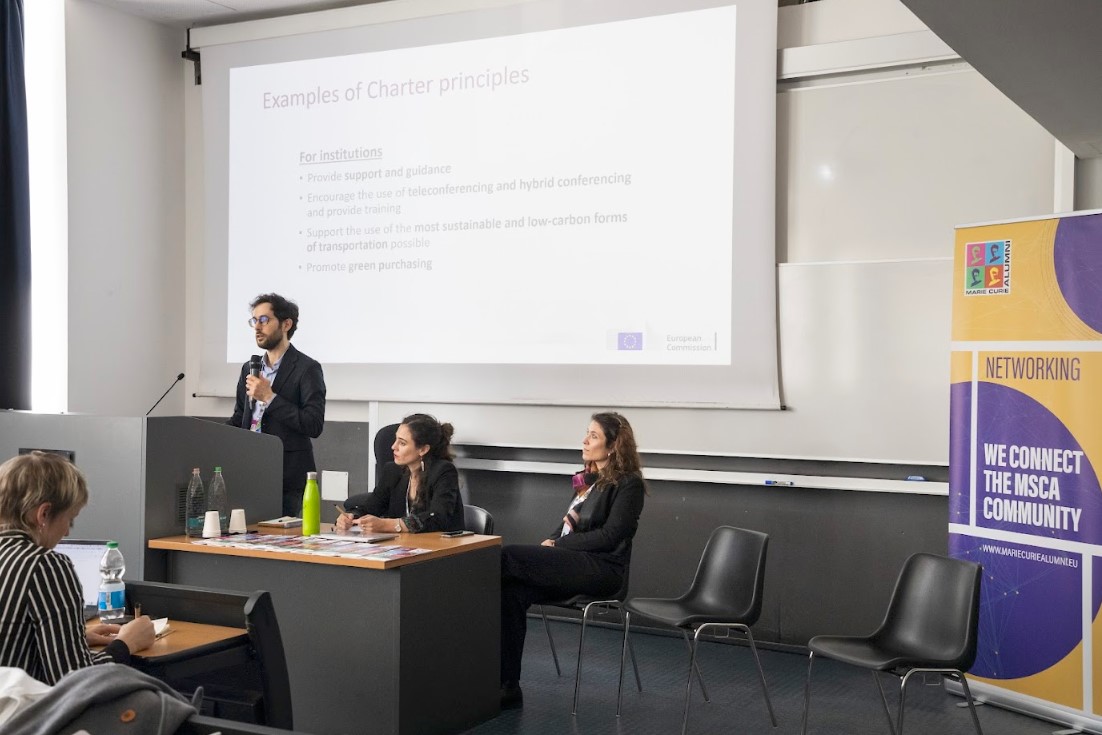MCAA Annual Conference 2024 - MCAA Sustainability: Actions and Reflections
Newsletter

Is it possible for scientific research to walk hand in hand with sustainability? This exploration ventures into the core of the Marie Skłodowska-Curie Actions (MSCA) Green Charter, illuminating the transformative journey of a community committed to environmental stewardship. Through challenges and successes, discover how researchers and institutions are reshaping the future of science, one sustainable step at a time.
Just as a seed needs soil, water, and sunlight to grow, so does the journey towards sustainability in scientific research demands inspiration, dedication, and actionable insights. At the forefront of this mission stand the speakers of the “MCAA Sustainability: What is Being Done?” session at the MCAA Annual Conference 2024, each contributing with their unique perspectives and experiences to the collective endeavour of integrating sustainable practices into research. Through this article, we will explore their stories and how they have navigated the challenges and opportunities of sustainability in their side. From implementing the MSCA Green Charter's principles to innovating within their institutions and projects, the speakers illuminate the path for researchers seeking to contribute positively to the planet. Their narratives reveal that embedding sustainability into scientific inquiry is not merely an added responsibility but an enriching opportunity to drive change, enhance research methodologies, and foster a healthier relationship with our environment.
The MSCA Green Charter: Catalysing Change
Robin Gadbled from the European Commission spotlighted the transformative role of the MSCA Green Charter in steering scientific research towards sustainability. Emphasising the Charter's core principles, Gadbled outlined a comprehensive strategy for integrating environmental considerations into the research landscape. This includes mainstreaming sustainability across all facets of research, reducing waste and harmful emissions, prioritising low-carbon transportation, and adopting teleconferencing tools to diminish travel’s environmental toll.
Gadbled’s presentation illuminated the dual focus of the Charter: guiding individual researchers in adopting sustainable practices and urging institutions to facilitate this shift. By providing support, guidance, and training on eco-friendly alternatives, the charter seeks to foster a research environment where sustainability is encouraged and becomes the norm. The Charter's broader vision, as highlighted in the Horizon Europe Work Programme, is a testament to the European Commission's commitment to minimising the environmental footprint of MSCA-funded projects.
Additionally, Gabled shed light on the nuanced progress and challenges in embracing the Green Charter, as revealed by recent surveys.
Notably, under half of the 2021 MSCA cohort were familiar with the Green Charter, yet a hopeful 71% intend to adopt its sustainability practices, supported by the 61% in institutions with established green policies. Nonetheless, 21% foresee challenges in incorporating these practices into their projects. To further ingrain sustainability in research, the MSCA introduced mandatory sustainability reporting in 2023, asking researchers to outline their commitment to the Green Charter. From 2024, sustainability will also influence the evaluation of competitive proposals, enhancing the Charter’s impact on research’s future direction. This move towards greater sustainability accountability means a significant step in the research community’s journey towards environmental stewardship.
My Green Lab: Pioneering Sustainability in Research
The insights shared by Marta Pérez Lloret, Marie-Curie Career FIT-PLUS fellow with PMTC and based at NUI Galway, emphasize that sustainability in research is not solely about monumental changes; it is equally about the small, everyday decisions that collectively drive substantial environmental impact reductions. Whether it is turning off unused equipment or opting for reusable resources, these actions symbolize a broader commitment to mindful consumption and waste reduction, principles that resonate deeply within the Lean Six Sigma methodology of efficient and sustainable management.
The My Green Lab initiative emerges as a testament to what can be achieved when the research community rallies around the cause of sustainability. This program not only champions environmental best practices in laboratories but also provides the tools and resources necessary for meaningful, actionable change. From competitions aimed at reducing the environmental footprint of cold storage to sustainability certifications, My Green Lab exemplifies the powerful synergy between innovation and environmental responsibility.
Reflecting on the Journey Towards Sustainability in MCAA
Insights from Alexandra Dubini, the outgoing vice-chair of MCAA and chair of MCAA Sustainability Interest Group, highlight the MCAA´s path and contribution towards sustainability. The interactive dialogue with the audience reveals an increasing need to implement sustainable practices, albeit acknowledging the existence of barriers. The majority intermittently prioritize ecofriendly products and manage digital clutter, highlighting the ongoing need for dedication to sustainability.
The conversations and initiatives presented not only advocate for a transition to sustainable practices but also underscore the essential values driving this shift. Key among these are responsibility, in recognizing the impact of research on the environment; innovation, in developing and adopting new methods to reduce that impact; and collaboration, as researchers and institutions come together to share knowledge and resources for a sustainable future. Through initiatives like the MSCA Green Charter and the collective action of researchers and institutions, a vision of a greener, more sustainable scientific community is coming into focus. Therefore, Dubini extended an invitation to individuals interested in sustainability to become part of the newly established MCAA Sustainability Interest Group at the session.
Polat Goktas
MCAA Newsletter Editorial Board
Senior AI Research Scientist, University College Dublin
polat.goktas@ucd.ie
@PolatGoktass
Mariana Rosca
MCAA´s Vice-chair of Sustainability Interest Group
Project Director
Transilvania University of Brasov
roshcam@yahoo.com